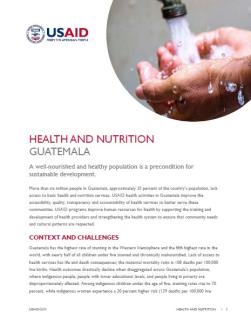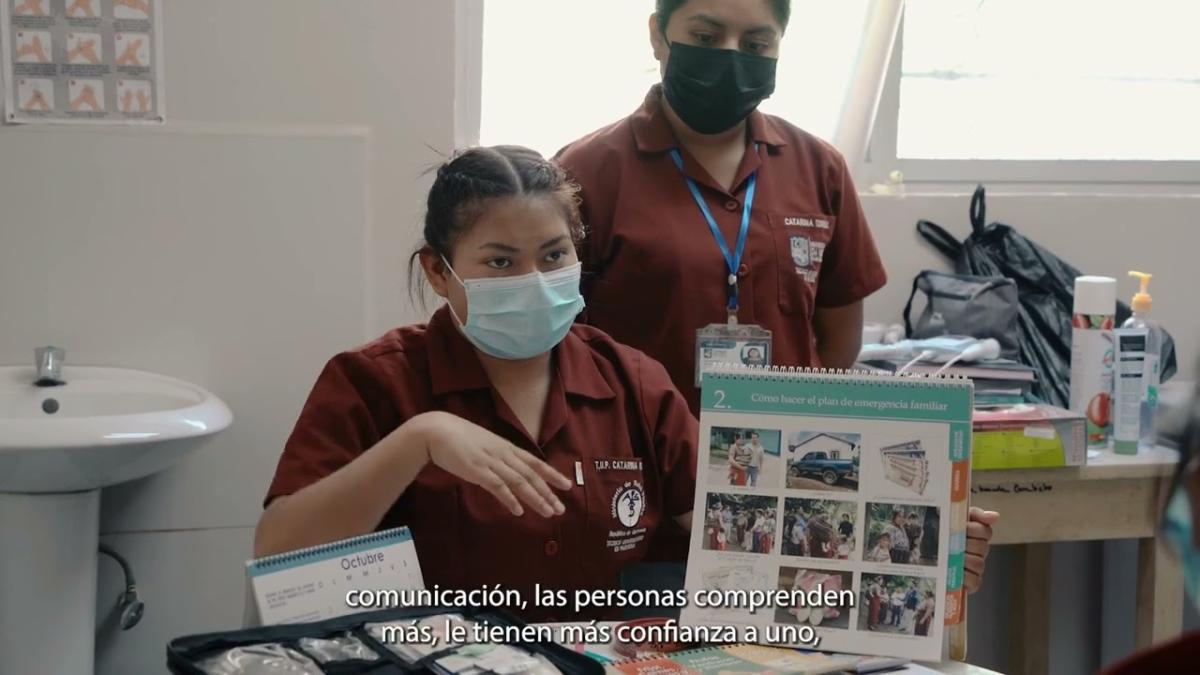
More than six million people in Guatemala, approximately 35 percent of the country’s population, lack access to basic health and nutrition services.
USAID health activities empower communities to improve accessibility of health services and reduce inequities; manage quality of health and nutrition services through local leadership, and support the Guatemalan health system to adopt sustainable approaches to mobilize and use their resources efficiently, effectively, and transparently.
CONTEXT AND CHALLENGES
Guatemala has the highest rate of stunting in the Western Hemisphere and the fifth highest rate in the world, with nearly half of all children under five stunted and the maternal mortality ratio is 113 deaths per 100,000 live births. Inequities drive the health and nutrition challenges in Guatemala, where indigenous people, people with lower educational levels, and people living in poverty are disproportionately affected. Among indigenous children under the age of five, stunting rates rise to 70 percent, while the maternal mortality risk in indigenous women is more than twice that of non indigenous women (MMR of 156 versus 75 deaths per 100,000 live births respectively). High teenage pregnancy rates (one in five girls nationally have given birth by age 19, one in four in the Western Highlands) further exacerbate Guatemala’s youth bulge and complicate educational and economic opportunities for young parents. The COVID-19 pandemic has highlighted the health systems challenges that persist in Guatemala and led to backsliding across all of these indicators. Guatemala also lacks surveillance, laboratory and systems interventions to prevent, detect, and respond to the next outbreak.
EMPOWERING COMMUNITIES TO ADDRESS INEQUITY
Through community health workers, USAID reaches mothers and children with primary healthcare such as promotion of family planning, antenatal and postnatal screening, developing plans for childbirth, growth monitoring, vaccination, and treatment of childhood illnesses such as diarrhea and pneumonia. USAID also supports social behavior change communication to foster health behaviors such as early and exclusive breastfeeding, hand washing, and improved child feeding practices. To reinforce outreach efforts, health workers also work with fathers, grandmothers, and community leaders to positively impact community norms.
USAID also works with civil society groups to advocate for improved access to health and nutrition services. Youth-led groups work with the Ministry of Health to improve adolescent-friendly services and lead interventions to prevent gender-based violence in communities. Men-led groups empower their peers to be responsible fathers and address harmful gender norms which perpetuate gender-based violence. Indigenous women-led groups work with the Ministry to advocate for increased access to culturally appropriate health and nutrition services in their communities.
LOCALLY-LED QUALITY IMPROVEMENT
USAID supports the Government of Guatemala to advance its decentralization agenda. For example, USAID works with municipalities and communities to develop and implement strategies to ensure access to potable water and sanitation services and improved monitoring of water quality. USAID is partnering with local area health directorates to systematically review infectious disease and routine health service delivery data to prioritize quality improvement interventions. USAID works with private universities and the Ministry of Health to provide scholarships for young indigenous women to become professional midwives. Graduates are placed into permanent jobs to improve the quality of services for pregnant women and children through culturally-competent care. Additionally, USAID works with civil society groups to conduct community-led monitoring of availability and quality of health services, medicines, and supplies.
EFFICIENT, EFFECTIVE, AND TRANSPARENT RESOURCE ALLOCATION
USAID is currently supporting the Ministry of Health to re-establish the primary health care system. Through this effort, USAID is helping to develop the model, analyzing costs, and evaluating tools and systems to improve the effectiveness of the health system. USAID also works with the Ministry of Health to strengthen health information systems and data analytics to enable data for decision-making thus fostering greater transparency. USAID is also supporting the national-level of the Ministry of Health to develop tools and systems to enable further decentralization of health and nutrition services. At the same time, USAID is supporting civil society organizations to advocate for transparency and greater resource allocation for family planning, nutrition, maternal and child health investments.
PREVENT, DETECT, AND RESPOND TO INFECTIOUS DISEASE OUTBREAKS
USAID is currently supporting the Ministry of Health to respond to the global COVID-19 pandemic. The current focus is expanding the reach of the health system to vaccinate underserved communities living in indigenous and rural communities. Recognizing that nearly 75 percent of all new, emerging, or reemerging diseases affecting humans at the beginning of the 21st century have originated in animals. USAID works to strengthen Guatemala’s multi-sectoral capacities in reducing the risk and impact of zoonotic disease threats that are of greatest public health concern. The program emphasizes systems strengthening at national and subnational levels and in multiple sectors for preparedness; laboratory; surveillance; workforce; risk communications; supply chain and related countermeasures. USAID embraces the One Health approach, recognizing the critical role that wildlife, livestock, other domestic animals, and environment play in emerging zoonotic diseases with pandemic potential and antimicrobial resistance.



